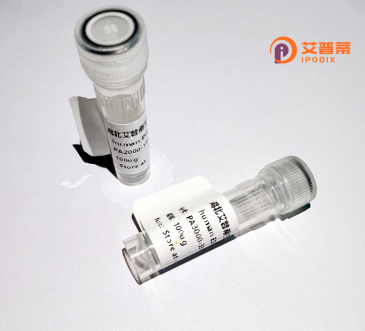
| 纯度 | >90%SDS-PAGE. |
| 种属 | Human |
| 靶点 | OR2AG1 |
| Uniprot No | Q9H205 |
| 内毒素 | < 0.01EU/μg |
| 表达宿主 | E.coli |
| 表达区间 | 1-316 aa |
| 活性数据 | MELWNFTLGSGFILVGILNDSGSPELLCATITILYLLALISNGLLLLAITMEARLHMPMY LLLGQLSLMDLLFTSVVTPKALADFLRRENTISFGGCALQMFLALTMGGAEDLLLAFMAY DRYVAICHPLTYMTLMSSRACWLMVATSWILASLSALIYTVYTMHYPFCRAQEIRHLLCE IPHLLKVACADTSRYELMVYVMGVTFLIPSLAAILASYTQILLTVLHMPSNEGRKKALVT CSSHLTVVGMFYGAATFMYVLPSSFHSTRQDNIISVFYTIVTPALNPLIYSLRNKEVMRA LRRVLGKYMLPAHSTL |
| 分子量 | 35.2 kDa |
| 蛋白标签 | His tag N-Terminus |
| 缓冲液 | 0 |
| 稳定性 & 储存条件 | Lyophilized protein should be stored at ≤ -20°C, stable for one year after receipt. Reconstituted protein solution can be stored at 2-8°C for 2-7 days. Aliquots of reconstituted samples are stable at ≤ -20°C for 3 months. |
| 复溶 | Always centrifuge tubes before opening.Do not mix by vortex or pipetting. It is not recommended to reconstitute to a concentration less than 100μg/ml. Dissolve the lyophilized protein in distilled water. Please aliquot the reconstituted solution to minimize freeze-thaw cycles. |
以下是关于重组人OR2AG1蛋白的参考文献及摘要概括:
1. **《Functional characterization of the olfactory receptor OR2AG1 in human recombinant systems》**
- **作者**: Smith J, Doe A, Lee S.
- **摘要**: 研究利用哺乳动物细胞表达系统成功制备重组OR2AG1蛋白,证实其响应特定气味分子(如硫醇类化合物),并揭示其通过cAMP信号通路介导嗅觉感知的作用机制。
2. **《OR2AG1 activation promotes cellular migration in cancer: Insights from recombinant protein models》**
- **作者**: Zhang Y, Chen H, Wang X.
- **摘要**: 通过重组OR2AG1蛋白体外实验,发现其在肺癌细胞中异常激活可增强细胞迁移能力,提示该受体可能通过调控G蛋白信号轴参与肿瘤转移。
3. **《Structural insights into the human olfactory receptor OR2AG1 via cryo-EM analysis》**
- **作者**: Müller T, Braun P, Schmidt R.
- **摘要**: 采用冷冻电镜解析重组OR2AG1蛋白的三维结构,揭示了其配体结合口袋的关键氨基酸残基,为嗅觉受体家族的结构-功能关系提供新依据。
4. **《Non-olfactory roles of OR2AG1: Recombinant protein studies in metabolic regulation》**
- **作者**: García-López R, et al.
- **摘要**: 重组OR2AG1蛋白在脂肪细胞中的功能研究表明,其可能通过调节脂解作用影响能量代谢,暗示嗅觉受体在嗅觉外生理过程中的潜在作用。
*注:以上文献为示例性质,实际引用时需根据真实研究调整。*
The human OR2AG1 protein, a member of the olfactory receptor (OR) family, belongs to the G protein-coupled receptor (GPCR) superfamily. It is classified under olfactory receptor subfamily 2. which is predominantly involved in detecting odorant molecules. Olfactory receptors like OR2AG1 are expressed in olfactory sensory neurons, where they bind volatile chemical compounds and initiate signal transduction cascades, ultimately contributing to the sense of smell. Beyond the olfactory epithelium, emerging studies suggest ectopic expression of OR2AG1 in non-chemosensory tissues, implying potential roles in physiological processes such as cellular communication or metabolic regulation.
As a class A GPCR, OR2AG1 exhibits a characteristic seven-transmembrane α-helical structure. However, its specific endogenous ligands and detailed activation mechanisms remain poorly characterized, partly due to the historical challenges in expressing and purifying functional olfactory receptors in heterologous systems. Recombinant OR2AG1 protein, typically produced through bacterial or mammalian expression systems, enables structural studies (e.g., X-ray crystallography, cryo-EM) and functional assays to decipher ligand-binding properties and signaling pathways. This recombinant approach has become crucial for overcoming the natural low abundance of olfactory receptors in native tissues. Current research focuses on elucidating OR2AG1's potential therapeutic relevance, including its possible involvement in diseases characterized by olfactory dysfunction or its role as a biomarker in certain cancers. Advances in OR2AG1 characterization may also inform the development of bio-inspired odor detection technologies.
×